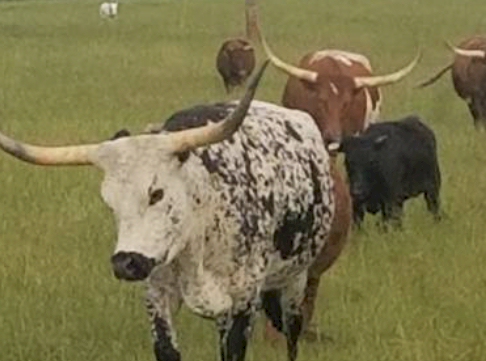The Texon is a composite breed - a cross between the Texas Longhorn, and the Beef Devon. The Texas Longhorn is uniquely suited to its environment - the Beef Devon, first introduced to the United States in 1623, is "beef breed supreme on grass." The project undertaken at Leaning Cedar Ranch will advance the breed, ensuring "grass-fed" remains the pre-eminent ranching strategy for sustainable beef on grass pasture.
The Texas Longhorn is part of American lore and legend; originating with cattle first brought to the Western Hemisphere by European explorers in the 15th century. The Longhorn was almost extinct by the early part of the 20th century, but is now recognized as a “genetic treasure.” The Texas Longhorn is distinct for two reasons:
- Each is a walking work of art – hand-painted by the Hand of God
- Each is fashioned entirely by nature right here in America
Longhorns, once overlooked as a beef animal, are gaining in popularity across the nation and across the globe. Their naturally lean meat is an advantage, and their ability to thrive on natural range conditions, without the use of added antibiotics, added hormones, or the use of feedlots, makes them an ideal animal for the lean, range-fed, and organic beef markets. Longhorns thrive in warm or cool climates, are very versatile, are extremely good mothers, and do not require special fencing. They are distinctively adapted to North America and as such, require little supplement if fresh water and good pasture are available. Longhorn bulls are often used as sires on other breeds of cattle; crosses produce fewer birthing difficulties and the calves grow quickly and have few health problems.
Texas Longhorns are known for their natural disease resistance, great longevity, high reproductive rate, ease of calving, ability to thrive under harsh range conditions, and ability to defend themselves against predators.
The Devon is one of the oldest beef breeds in existence today. In fact some authorities consider the Devon's origin to be prehistoric, the assumption being that the breed descended directly from Bos lonqifrons, the smaller type of aboriginal cattle in Britain. The first Devon cattle reached what is now the United States in 1623. The ship Charity brought a consignment of red cattle (one bull and three heifers) from Devonshire to Edward Winslow, the agent for Plymouth Colony. These red cattle of Devonshire, brought in by the Pilgrims, were probably the first purebred cattle to reach North America.
The characteristics of the Devon make them a valuable "genetic tool" for the commercial beef industry. The breed has long been noted for its fertility, calving ease, docility, hardiness and ability to adapt to temperature extremes. The well-developed heat-regulating mechanism of the scrotum of Devon bulls give them an unusual ability to remain fertile despite extremely high environmental temperatures. Devons are active good "walkers" and are excellent rustlers and grazers. In England, they are known as "the Beef Breed Supreme at Grass." Their ability to efficiently utilize grass and other forages has heightened their popularity in areas like southern Brazil, Australia, and New Zealand.
For additional information on the Texas Longhorn breed see the articles on Wikipedia, Breeds of Livestock – Texas Longhorn, or any of the several ranch sites raising and selling longhorn cattle. For the Devon breed see the information at Red Devon USA.
The Texas Longhorn Breeders Association of America (TLBAA) is the breed association we associate with on Leaning Cedar Ranch.
Source: Content and Image from
Leaning Cedar Ranch.

